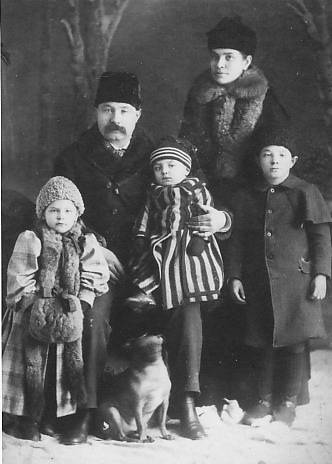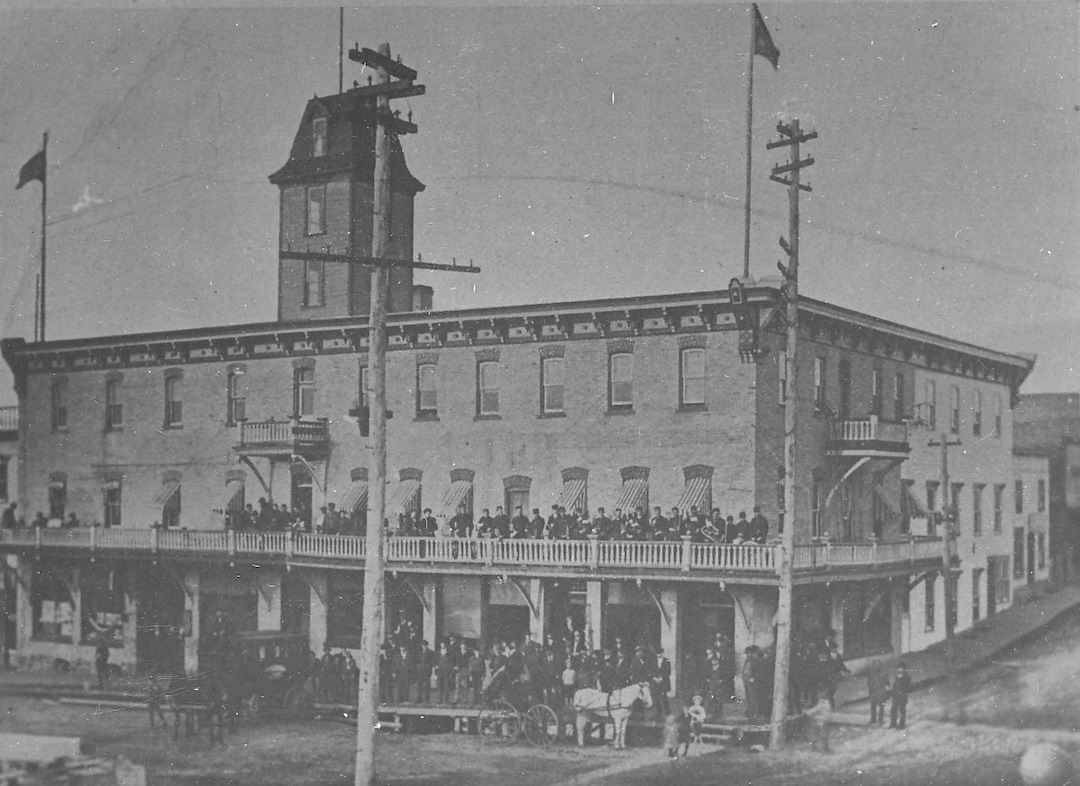The Hilliard House
Lake of the Woods Museum Newsletter
Vol. 26 No. 1 – Winter 2016

In 1883, local hotelier Louis Hilliard opened the Hilliard House on the northeast corner of Main and Second Streets in Rat Portage (now Kenora).
The following is the story of Hilliard’s fine establishment as recounted in newspapers of the day at three significant times in the building’s history.
Taken from The Semi-Weekly Record, Rat Portage, December 14, 1895:
Like good wine, the Hilliard House at Rat Portage seems to improve with age. If you have never visited that charming spot, it is worth your while doing so, not only because the town and surroundings are charming but because everyone should know genial Louis Hilliard. He is the proprietor of one of the best hotels along the line of the Canadian Pacific Railway. When the hotel was first opened it consisted of a modest wood structure on the site of the present palatial building, but Louis who is ever alive to the growing demand for increased accommodation, from time to time added wings and storeys, until the Hilliard House now has accommodation for upwards of 400 guests. The hotel occupies the most prominent corner of the town, and commands a fine view of the charming scenery not only on the Lake of the Woods but of the whole surrounding country. For many years Rat Portage has been admittedly the Saratoga of the West and indeed it is the only great pleasure resort between Port Arthur and Calgary. With Manitobans especially, Rat Portage is the Mecca during the summer months, and during June, July and August, one has to engage rooms weeks ahead if accommodation at the Hilliard House is desired.

The Hilliard Family.
Its airy bedrooms, spacious parlors and many balconies make the Hilliard an ideal hotel for summer tourists, and many a Winnipeg family look forward to the months spent with Louis Hilliard. A very prince of bonifaces is this landlord. Although for many years a resident of Canada, he still speaks the English language but brokenly, and every male guest who has every stopped with Louis is thoroughly familiar with his oft’ repeated invitation, “Well I t’ink we better have another smile – again!” Many a good story is told of Louis and his favourite word “again”. Not long ago a funeral was passing the hotel when a guest asked who was being buried. Louis replied: “Oh, Jack Smith’s wife is dead – again.” If a vote were taken to see who is the most popular man in the Rainy River district, Louis Hilliard would score an easy first, for he has a big heart and is ever ready to help out anyone in hard luck.
During the summer months, Louis is in his element. Everything that will in any way contribute to the comfort and pleasure of his guests is done, regardless of cost. A first-class orchestra is kept in the house to furnish music for unlimited dancing and twice a week “hops” are given not only for the hotel guests but cottagers and campers from the neighboring islands are made heartily welcome.
In the basement of the building are situated the bar and billiard rooms and a large number of cosy retreats. These have been dubbed the “catacombs.” Here many a good story has been told, many a mining deal made and many a bottle of wine opened…The bar is liberally stocked with the choicest ales, wines, liquors and cigars, the store rooms containing sufficient stock for a wholesale store. The public sitting room is fitted with immense plate glass windows overlooking the main street after the style of English clubs and here it is that one hears all the news of the district. While enjoying an after dinner cigar one can hear all the mining news discussed; in fact many a mining deal has been made there involving thousands of dollars. The house is steam-heated and electric lighted throughout and is first class in every respect.
Taken from The Rat Portage Miner, November 26, 1901:
HILLIARD IMPROVEMENTS : The Hotel is Now One of the Best Equipped in the West
Yesterday the improvements to the Hilliard House, which have been going on for several weeks past, were concluded and the army of carpenters, painters, electricians and other artisans gathered up their tools and departed. Mention has been made from time to time in these columns of the progress of the work, and all that remains to be spoken of now are the billiard rooms and bar. Manager Percival has closed up the basement which was formerly used as bar and billiard room,and transferred them to the ground floor, two stores on Main Street being taken for this purpose. Swing doors connect the spacious rotunda with the billiard room, which is fitted up handsomely and with large spaces between the tables.
The bar is a triumph of the wood worker’s and decorator’s arts. The back wall is covered with an enormous plate glass mirror, framed in carved cherry wood, the liquor cabinets being built of the same material. The bar itself is of polished walnut on a base of carved birch. The walls are covered with moulded steel panels, which are painted a sober yellow, the frescoes standing out in gold. The wainscott, which is also of moulded steel, is a daring example of decorative art, embossed Grecian lyres in bold relief on a beautiful green of uncertain shade, which is sometimes of a turquoise tint. The panels here are embellished with scrolls of oak and myrtle, standing out like the lyres, in gold. Several magnificent moose heads are displayed around the walls, and over the double doors, which give entrance from the Main street, a great eagle with extended wings looks down on the patrons of the place. There are four airy rooms for travellers and business men to meet in and discuss deals and other things. The stock of imported liquors is not only large but well assorted, so that any wine or liqueur that is sold anywhere in the civilized world can be obtained here.

The Hilliard House.
Mr. W.R. Gerrie is responsible for the architectural part of the woodwork; Messrs. Scott and Hudson having done the carving, and Mr. Gauthier the wood polishing. The painting and decorating is the work of Mr. Longley who is to be congratulated for showing what can be done in this line when expense is disregarded…
Taken from The Winnipeg Free Press, January 28, 1902:
FIRE VISITS RAT PORTAGE
Rat Portage, Ont. Jan. 27 – The fifth fire since Jan. 1 and the most disastrous in many years, broke out in the Hilliard House kitchen shortly after 2 o’clock this morning, and before it was checked caused a damage of $50,000. The blaze could have been controlled had not the first hydrant the fire brigade hitched to been frozen up, but before they could connect with another the flames had gained such headway that nothing could have saved the Hilliard House.

Fire at the Hillard House.
When the alarm was first given every means was taken to awaken the guests, who with the help, numbered about one hundred people. Several of the latter only escaped with their night clothes. One dining room girl lost $140 in cash besides her trunk and clothes, and all the rest escaped with only what they could grab from their rooms. Mr. Percival, the manager, when awakened, took every chance to save the guests and in his anxiety for them lost several valuable diamonds which were in his room, besides a valuable wardrobe.
The flames spread with incredible speed, and in less than 30 minutes from the time of the outbreak the entire Hilliard House was enveloped in flames. The fire next spread to Wilsons’ second hand store, and then to John Gardner’s butcher shop on Second Street, and it was at once apparent that the Queen’s Hotel would also go. The flames were fanned by a west wind and the firemen were hampered by a 35 below zero frost, but notwithstanding these disadvantages they managed to confine the fire to the buildings already mentioned.
It was 8 o’clock this morning before the flames were under control and then the dire disaster dawned upon the residents of the town.
The Hilliard House and the Queen’s Hotel are a total loss as are also Wilson’s and Gardner’s. The Hilliard House, which was inseparably associated with the history of Rat Portage was worth about $25,000. (later reports indicate the value of the building was $60,000, the furnishings $20,000).
Taken from The Winnipeg Free Press, January 28, 1902:
LOSS OF THE HILLIARD HOUSE
… An incident of the fire not known to many was the removal of Mr. John Stewart, an invalid, who with his wife and niece had apartments over Gardner’s butcher shop. He was the first taken across the street to Sharpe’s boarding house, but when the fire came dangerously near he was taken farther up Second Street, and finally taken to the home of a friend on the Rideout estate, where he is resting easily.
Ferrier’s grocery store, nest to Gardner’s block, had a close call, but the only damage was done by smoke, and the loss is fully covered by insurance.
J. Hose’s fine block on the south side of Second Street, just opposite the Hilliard House, as well as Johnson’s pharmacy, and Miss Cook’s millinery parlors, had a close call, and were only saved by the careful attention of the firemen. As it was Mr. Hose’s plate glass windows were cracked from the heat.
P.H. Austin, representative of the Ontario Powder Co. had his office in the Hilliard house, and lost everything except a few books.
A great deal of suffering was caused to the guests and employees of the hotels, who escaped with barely any clothing, into a temperature of 35 below zero. J.G. Gaudier (should be Gaudaur), of the Russell house, J.O. Beaudro, of Central House, Louis Bois, of the Ottawa House, and W. Shaw of the Shaw House, threw open their houses to the guests and employees, and did all in their power to relieve their suffering.
The fire brigade deserve all credit that can be given them for their heroic fight. Coated with ice, with frost bitten hands, feet and faces, they stood hour after hour and poured water on the flames, and when they could stand no longer their places were taken by citizens, who freely volunteered their services.
Did you know?
The Sultana Gold Mine was the largest of the mines on the Lake of the Woods, and between 1890 and 1906 produced over $1million dollars in gold.
